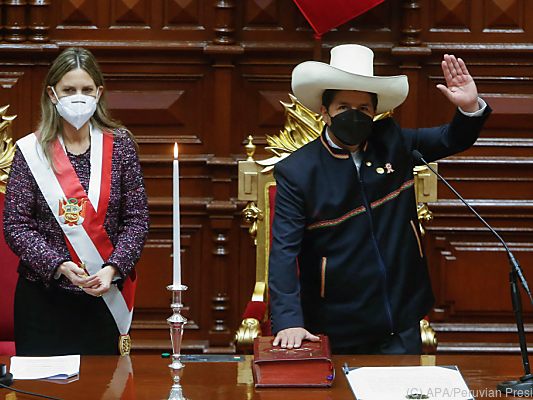
Castillo was sworn in
© APA/Peruvian Presidency
After a very slim electoral victory, new Peruvian President Pedro Castillo took office. The 51-year-old was sworn in in Congress in Lima on Wednesday. The former village teacher promised “a new constitution and a new Peru” on the South American nation’s 200th Independence Day. “We are a people’s government,” he said. “Peru is now ruled by a peasant.”
As in the election campaign, Castillo wore the traditional straw hat from his home region of Chota during his inaugural address. He recalled the lost Inca Empire in today’s Peru, European exploitation of natural resources and 200 years of independence.
Castillo pledged to create one million jobs annually, government assistance to poor families, and investment in education. “We want to build a more prosperous and just country,” he said. He also announced health care reform and the construction of new hospitals in rural Peru.
The leftist politician also used his inaugural address to dispel fears of a radical agenda: “We do not want to nationalize any branch of the economy, private property is guaranteed.” But he also called for profits to be made from mining, for example, to further benefit the regions in the future. “If the project does not bring any social gain, it will not be implemented.”
Castillo succeeds Francisco Sagaste, who took over state affairs as interim president at the end of last year during an internal political crisis. Castillo’s enthronement ceremony included King Felipe of Spain and the heads of state of Argentina, Chile, Ecuador and Colombia.
The former village teacher narrowly defeated right-wing populist Keiko Fujimori in the runoff election. The daughter of former governor Alberto Fujimori (1990-2000), who was imprisoned for human rights violations, filed a series of complaints. Just last week, Castillo was officially declared the winner of the election.
The farmer, the teacher, and the trade unionist mainly represent the Peruvian countryside. Farmers and indigenous people in particular have hardly benefited from Peru’s significant economic growth in recent years, and often live in extreme poverty. He found his motto with them: “No more poverty in a rich country.”
Castillo had never held political office until he was elected president. The challenges the new head of state now faces are formidable: Peru is particularly affected by the coronavirus pandemic. It is one of the countries with the highest mortality rate in the world, and the economy collapsed at 12.9 percent. The past year was also marked by a bitter conflict between the government and Congress.
However, it is unclear whether Castillo was actually able to implement his political ideas. His Marxist-Leninist party, Piri Lieber, does not have a majority in Congress. So, Castillo has to forge alliances in order to accomplish his agenda.

“Food practitioner. Bacon guru. Infuriatingly humble zombie enthusiast. Total student.”








More Stories
Kyiv: Russian Kursk offensive halted
US Presidential Election: Former US Government Officials Warn Against Donald Trump's Election
Netherlands wants to leave asylum system